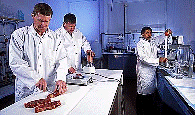United States Department of Agriculture: Agricultural Research Service, Lincoln, Nebraska

Roman L. Hruska U.S. Meat Animal Research Center: Reports
Date of this Version
10-1-2021
Document Type
Article
Citation
Theriogenology 173 (2021) 128-132
https://doi.org/10.1016/j.theriogenology.2021.07.020
Abstract
Polymorphisms in μ-calpain (CAPN1) that beneficially associate with beef tenderness are reported to antagonistically associate with calving day in beef heifers and post-partum interval to estrus in beef cows. We, therefore, hypothesized that a molecular breeding value for slice shear force, calculated based on CAPN1 and calpastatin (CAST) genotypes, would demonstrate an antagonistic relationship between genomically predicted slice shear force and ordinal calving date in replacement beef heifers. A secondary objective of this study was to evaluate the association of a polymorphism in diacylglycerol O-acyltransferase (DGAT1) with reproductive traits in beef heifers. One hundred eighty-seven MARC III heifers (¼ Angus, ¼ Hereford, ¼ Red Poll, and ¼ Pinzgauer) that had been selectively bred to increase the frequency of these polymorphisms were submitted for monthly ultrasound exams beginning at 333 d of age and continuing until the start of breeding to determine pubertal status. At the last exam before breeding, all antral follicles were counted, and the length and height of each ovary was measured to determine if genomic selection for slice shear force associated with ovarian follicle number. Calving date, calf gender, and calf birth weight were recorded at parturition. Regression analysis of the molecular breeding value for slice shear force of the heifers on ordinal calving date indicated no association between genomic prediction of tenderness and calving date (P = 0.16); however, there was a tendency for age at puberty to be delayed in heifers as genetic merit for tenderness improved (P = 0.09). The results of the present study indicate that within experimental precision, selecting for tenderness using genomic predictions had minimal or no antagonistic association with reproductive performance in heifers. Further analysis of reproductive performance as cows is needed within this population but applying these genetic markers to select for tenderness in steers does not antagonize reproductive traits influencing conception or first calf birth date and birth weight in replacement beef heifers.


Comments
U.S. government work